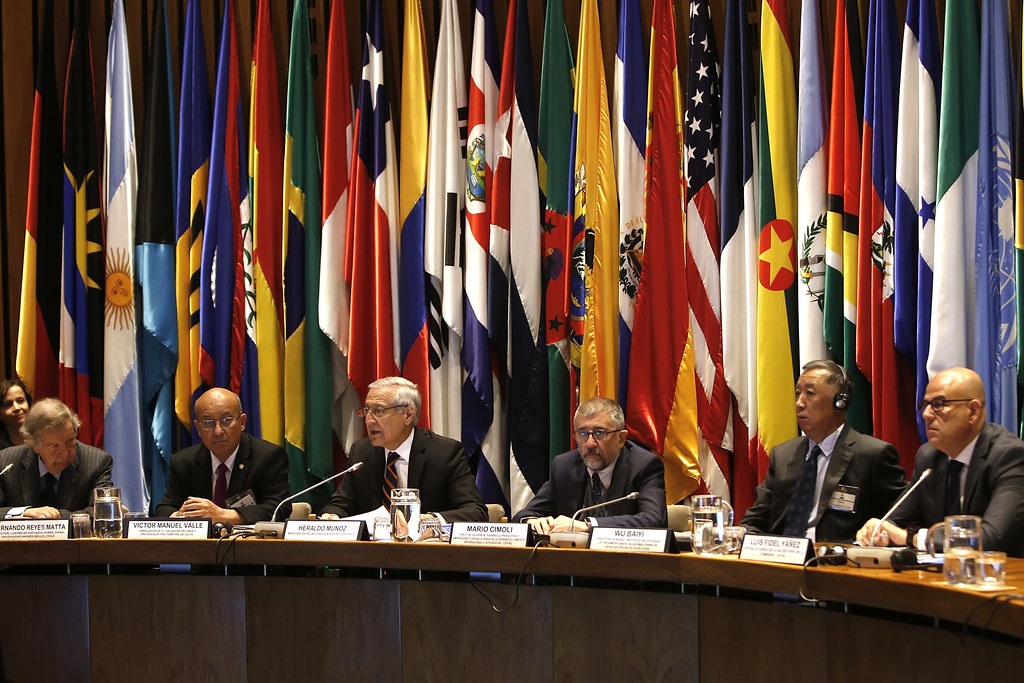Too many sticks, too few carrots

(Archive) The First ECLAC-China High-level Academic Forum was held at ECLAC headquarters in Santiago, Chile, on 17-18 October 2017 (Credit: Carlos Vera/ECLAC/Flickr)
The US has deliberately failed its southern neighbors by derailing, rather than supporting their development efforts
Eighty years ago, the world was emerging from the most devastating war in history, which cost the lives of almost 80 million people. Fortunately, the Nazi, fascist and militarist forces were defeated by a large coalition of the allied countries that, at the end of the conflict, joined forces to create the United Nations. This institution has helped to reorganize the international order ever since.
That year, the terror and commotion caused by the war gave way to an era of optimism, in which cooperation and respect for human dignity and the right to economic development would be the basis for building a new coexistence between nations. European colonialism began to crumble. In 1947, India became independent. In 1949, the victory of the Chinese Civil War occurred. In the following decades, people in Asia and Africa achieved national independence. But unfortunately, in 1947, the United States initiated a policy of containment of the socialist camp, mainly against the Soviet Union. Once again, humanity was on the brink of a devastating war, this time with the threat of a nuclear conflict between the superpowers.
In 1949, in the wake of a movement of hope for a more equitable world, the Economic Commission for Latin America and the Caribbean was created. This UN body is responsible for designing economic theories and policies to support the region’s development. Raúl Prebisch and Celso Furtado became known worldwide as the leading theorists of economic development theory. They formulated policies that inspired several countries to seek industrialization to overcome economic and social backwardness.
 ECLAC headquarters in Santiago, Chile (Credit: ECLAC website)
ECLAC headquarters in Santiago, Chile (Credit: ECLAC website)
It is interesting to note that ECLAC was created despite the opposition of the US government, precisely when the Washington government was directing billions of dollars to reconstruct Europe and Japan through the Marshall Plan. Many leaders in Latin America and the Caribbean imagined that the US government would support their development efforts, but this was an illusion. On the contrary, during the Cold War, the US intervened to stifle any government that could organize a national development policy. Getúlio Vargas in Brazil, Juan Domingo Perón in Argentina and Jacobo Arbenz in Guatemala, among others, were overthrown by military coups supported by the Central Intelligence Agency under the pretext of fighting communism. During the 1950s, the US abandoned the “carrot” of Franklin Roosevelt’s “Good Neighbor Policy”, which rallied most LAC countries to the allies during World War II, and adopted the “stick” to control what it called the Western Hemisphere, a geographical-turned-political term.
In 1961, in the first year of the John Kennedy administration, the US created a plan to undermine the influence of socialist ideas and the Cuban Revolution in Latin America, the so-called Alliance for Progress, a new “carrot”. However, this initiative did not leave anything significant. Underdevelopment, social inequalities and income concentration continued to spread among countries in the region. From 1964, when Brazilian president João Goulart was deposed, US policy was to sponsor a lot of coups d’état and military interventions, as occurred with the deposition of Juan Bosch in the Dominican Republic, Salvador Allende in Chile and Isabel Perón in Argentina. The authoritarian wave lasted until the end of the 1980s.
After the failed initiatives of the Free Trade Area of the Americas under the George W. Bush administration in 2002 and Growth in the Americas during Donald Trump’s first term in 2019, the Joe Biden government in 2022 held the Summit of the Americas in Los Angeles, at which the US announced a new “carrot” by creating the Americas Partnership for Economic Prosperity. This initiative promised to attack the causes of underdevelopment, poverty, violence and social inequalities in Latin America and the Caribbean. The proposal had as its backdrop the so-called nearshoring, that is, the reorganization of global production chains toward the US neighborhood to welcome companies that would be forced to withdraw their activities from China and Asia. During the Biden government, two meetings were held, in 2023 and 2024, but nothing tangible was presented. When looking at the portfolio of projects financed by the International Development Finance Corporation, no significant investment was found that could economically transform the region’s countries. With Trump back in power, the US has stopped offering carrots and is only using sticks to achieve its goals. The problem of illegal immigration is being solved (at least in theory) by severely repressing the Latin American population. The first wave of tariffs hit Mexico, along with Canada, hard. The announcement of generalized tariffs for all countries has also hit the other countries in the LAC region. The pressure on Panama is reminiscent of Theodore Roosevelt’s gunboat policy over a hundred years ago.
An interesting aspect of the US policy toward the region concerns China. US Secretary of State, Cuban-American Marco Rubio, is visiting countries in the area to pressure them to distance themselves from the Asian country, arguing that the Chinese presence is a threat to hemispheric security. However, Rubio ignores the fact that Latin American and Caribbean countries need opportunities to overcome their backwardness, something that the government in Washington ignores. It is important to emphasize that China keeps its market open for countries in the region, encourages infrastructure projects through the Belt and Road Initiative, and strongly contributes to the energy transition through investments in clean energy or installing an electric vehicle industry. Furthermore, China does not impose conditions or use a carrot-and-stick policy to pursue its interests.
In the current situation, where blackmail has become a new form of diplomacy, Latin American and Caribbean countries must find new paths that benefit their populations. In this sense, the China-CELAC Forum, which is being held in Beijing, will be a unique opportunity to advance cooperation and seek new ways to keep the global economy open and inclusive. ![]()
* Marcos Cordeiro Pires is a professor of international political economy at Sao Paulo State University in Brazil.
** This article was originally published in China Daily, on May 13th, 2025, and republished here with the author’s permission. This content does not necessarily reflect the opinion of OPEU, or INCT-INEU.
*** About OPEU, or to contribute articles, contact editor Tatiana Teixeira. E-mail: tatianat19@hotmail.com. About our Newsletters, for press service, or other matters, contact Tatiana Carlotti. E-mail: tcarlotti@gmail.com.
Subscribe to our Newsletter and receive OPEU content by email.
Follow OPEU on Instagram, Twitter, Linkedin and Facebook and follow our daily posts.
Comment, share, send suggestions, be part of our community.
We are a unique Brazilian research observatory on the United States,
with weekly, free, non-profit content.





















